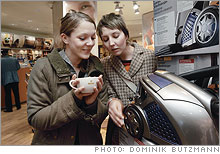|
Where Starbucks meets the Sharper Image
Germany's Tchibo sells coffee alongside a rotating menu of consumer products.
(Business 2.0 Magazine) - The selection at most cafes is predictable: Along with your latte, you might order a biscotti or a slice of cake -- maybe a CD. But at the more than 1,200 Tchibo shops scattered throughout Europe, there's always something new to buy from the barista -- like a telescope, a cell phone, or perhaps a cordless drill. With its blue-and-gold coffee-bean logo and 2004 revenues of 3.8 billion euros ($4.6 billion), Germany-based Tchibo claims to be the world's fifth-largest coffee seller. Every Wednesday, however, Tchibo stores unveil an all-new collection of nonfood consumer products -- a mix of 25 to 30 items grouped around a broad theme such as "World of the Senses" (think scented bath oils, yoga mats, and candles) or "Italy" (Parmesan graters and dishware).
"The combination brings different customers into the store," says Tim Danaher, editor of Retail Week, a British trade magazine. "Some go for coffee and end up buying household items, while others buy household items and stay for a cup of coffee. The real addicts visit the store every week to see what's new." A different brew
It's an effective blend: In addition to being Germany's leading coffee merchant, Tchibo is one of the country's top 10 clothing retailers. The 1,800 nonfood items Tchibo sells annually under its own TCM label reportedly account for as much as 75 percent of turnover at some stores, and the company usually moves 100,000 units of each product it offers. The two-stores-under-one-roof concept began percolating 30 years ago. Founded in 1949, Tchibo originally sold fresh-roasted beans by mail. In the 1970s the company wanted to reward loyal customers with cookbooks, but giving such items away for free was verboten by German regulations. The books had already been printed, however, so Tchibo sold them via mail order and in its shops. The cookbook was a hit -- 250,000 copies sold in just a few days -- and soon Tchibo was displaying items such as pots and pans alongside bags of coffee. During the 1980s the company began adding new products to its lineup each year. Since 1994, Tchibo has upped the tempo, rolling out a new collection every week. The idea seems to travel well. In recent years Tchibo has opened stores in Austria, the Czech Republic, the Netherlands, Poland, Switzerland, and the United Kingdom. Services are the next frontier: In 2004 the company partnered with European mobile provider O2 to sell phones with flat-rate contracts, and 435,000 customers signed up within the first year. Tchibo is also teaming up with financial services firms to sell insurance and retirement accounts. A mutual fund isn't as sweet as a chocolate croissant, but its profit potential is far more tasty.
To send a letter to the editor, click here. |
|

